Squamous Cell Carcinoma Treatment Advice
Home » Conditions » Squamous Cell Carcinoma Treatment Advice
Skin Cancer Can Be Fatal
Not sure about your condition? Get in touch now, there is no reason for you to wait.
Award winning dermatology service, with over 20 years of experience
Short waiting lists, on some occasions offering same week appointments
Safe environment, in Care Quality Commission approved facilities
SQUAMOUS CELL CARCINOMA TREATMENT IN LONDON
Squamous cell carcinoma (SCC) is a form of non-melanoma skin cancer. Non-melanoma skin cancer is the most common form of skin cancer, with over 147,000 new cases diagnosed in the UK every year (approximately 90% of all skin cancers) and is characterised by cancer developing in the upper layers of the skin. The two most common types of non-melanoma skin cancer are basal cell carcinoma and squamous cell carcinoma. Squamous cell carcinoma is the less common of the two and accounts for approximately 20% of all non-melanoma skin cancer. Most Squamous cell carcinomas can be cured, however a small amount can spread to other areas of the body, particularly the lymph nodes so it is important to see a consultant if you believe you have a SCC.
The incidence of all types of skin cancer has increased dramatically over the last few decades. At the Harley Street Dermatology Clinic, we are experts in diagnosing and treating cancer. Whether it be treated by topical therapy, radiotherapy or plastic surgery, you can rest assured that our consultants will provide you with the best possible care. Please see before and after images below of skin cancer treated surgically.
Alternative names: SCC, non-melanoma skin cancer
WHAT IS SQUAMOUS CELL CARCINOMA?
Squamous cell carcinoma is the second commonest form of skin cancer accounting for around 10% of skin cancer in the UK. It is a malignant tumour arising from the epidermis at the skin surface. SCC is classified by its level of ‘differentiation’ (i.e. how abnormal the cells and tumour structure appear under the microscope). Tumours can be well, moderately or poorly differentiated.
The rate of growth and chance of spread of SCC depends on the differentiation the tumour exhibits with well-differentiated tumours being less aggressive than poorly-differentiated ones:
- Well differentiated SCC tend to grow slowly with a very low chance of spread
- Moderately differentiated SCC a slightly higher rate of growth and chance of spread than well differentiated tumours
- Poorly differentiated SCC often rapidly growing and highly likely to spread if left untreated
Risk factors of SCC include those with pale skin who are more likely to burn in the sun, those who have spent prolonged periods exposed to sunlight and those who have used tanning beds. If you have had SCC before, you may also be more likely to develop the condition again. Squamous cell carcinoma is not hereditary, however some of the risk factors including skin type are likely to run in families. SCC are also more common in those with reduced immune systems, either due to medical treatment or diseases which affect the immune system.
WHAT ARE THE SYMPTOMS OF SQUAMOUS CELL CARCINOMA?
Squamous carcinomas tend to look like patches or lumps arising from the skin with a scaly surface (see images). They tend to grow in size over time. They may have a crater-like appearance and ulcerate. Sometimes they can discharge foul-smelling yellow keratin, similar to pus.
They can appear anywhere on the body, but most commonly found on areas of the body which are more frequently exposed to sunlight, including the face, head, neck and ears.
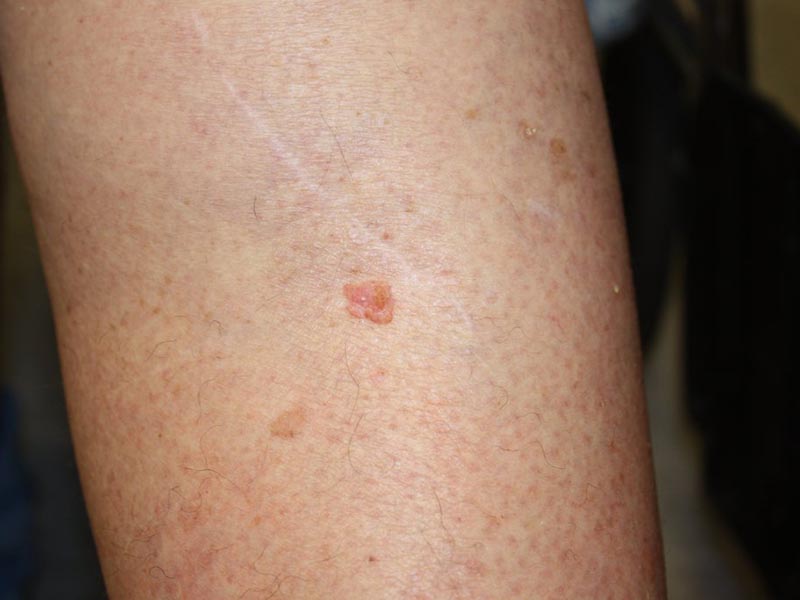
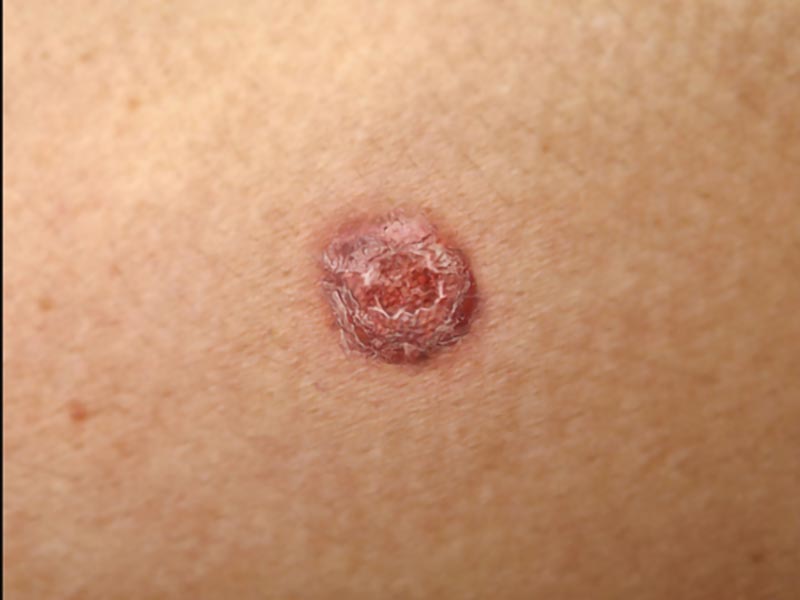
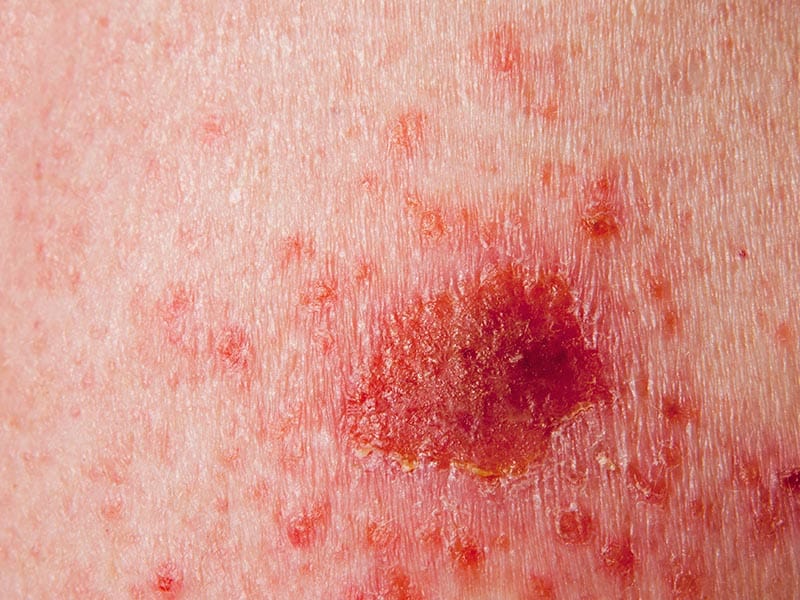
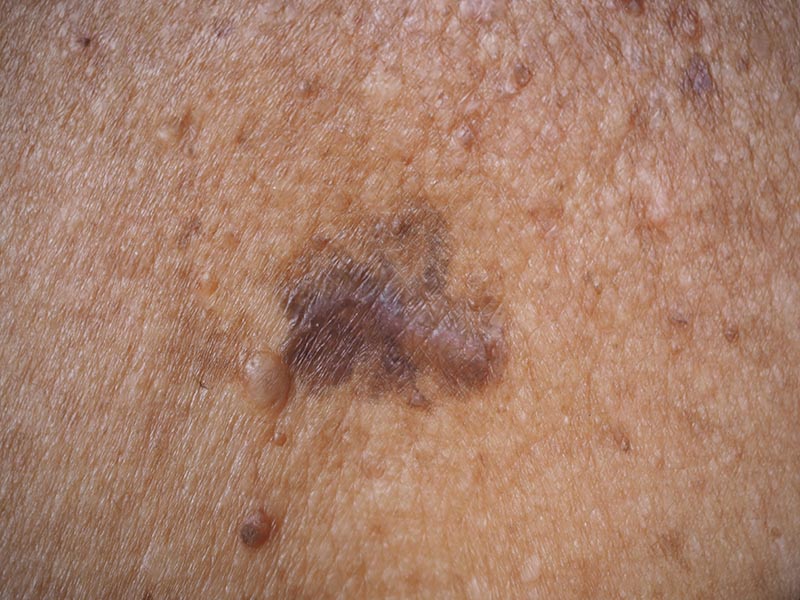
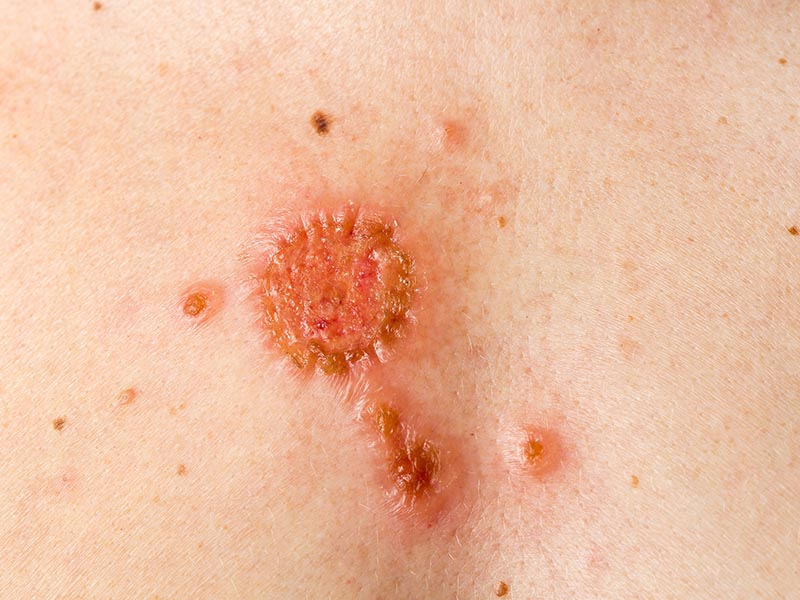
HOW CAN SQUAMOUS CELL CARCINOMA BE PREVENTED?
You can lower your chances of developing squamous cell carcinoma by reducing your exposure to UV light, both in the form of sunlight and sunbeds. When out in the sun, it is important to protect the skin from sunburn by using a high factor sun cream, avoiding the sun during the hottest part of the day and covering the skin when exposed to sunlight. The earlier squamous cell carcinoma is diagnosed and treated, the less likely you are to be left with scarring so checking your skin regularly for signs of skin cancer is really important. If you notice anything on your skin you are worried about, see a consultant dermatologist who will assess your lesion and can carry out treatment if required.
HOW CAN SQUAMOUS CELL CARCINOMA BE TREATED?
Squamous carcinomas can be treated with surgical excision or localised radiotherapy.
Our consultants at the Harley Street Dermatology Clinic offer diagnosis and treatment to patients with squamous cell carcinoma.
Remember that the earlier your squamous cell carcinoma is diagnosed and treated, the less the cosmetic disfigurement and the less chance of recurrence or spread.
FREQUENTLY ASKED QUESTIONS
HOW MIGHT SQUAMOUS CELL CARCINOMA AFFECT ME?
The rate of growth and chance of spread of squamous cell carcinoma depends on the differentiation:
- Well differentiated SCC tend to grow slowly with a very low chance of spreading
- Moderately differentiated SCC have a slightly higher rate of growth and chance of spreading than well differentiated tumours
- Poorly differentiated SCC often grow rapidly and are highly likely to spread if left untreated
IS SKIN CANCER HEREDITARY?
Skin cancer is not hereditary in the sense that it is passed down through a gene. However, skin type does run in families so those more likely to develop skin cancer are often in the same family.
WHO IS MOST AT RISK OF GETTING SKIN CANCER?
Men are more likely than women to develop skin cancer and it is more common in the elderly.
WHAT FACTOR SUNSCREEN SHOULD I USE?
It is recommended to use a high factor of sunscreen no matter your skin type. SPF30 with a 4-star UVA rating during the summer is recommended for those with paler skin to stop burning but also to help prevent wrinkles and sunspots in those who don’t burn as easily.
DO SUNBEDS CAUSE SKIN CANCER?
Research shows sun beds are a significant risk factor in skin cancer.
HOW CAN I PREVENT SKIN CANCER?
Protecting your skin is, of course, always the best course of action. The easiest ways you can do this include:
· Wearing a waterproof, high level of SPF protection when in the sun
· Use a daily moisturiser with SPF protection
· Avoid the sun when it is at its strongest during the day
· Wear a hat when in the sun
· Sit in the shade
HEAR FROM OUR PATIENTS
Start Your Journey With Us
Please fill in this form and one of our team will give you a call back to arrange a consultation with one of our expert dermatologists.
WHY TREAT SQUAMOUS CELL CARCINOMA AT HARLEY STREET DERMATOLOGY CLINICS?
Having the right dermatologist is important especially when you have a chronic skin condition that will require ongoing treatment. We want you to feel confident that we’re providing you with the best possible care. We also want you to feel as comfortable as possible with your dermatologist.
The Harley Street Dermatology Clinic specialises in conditions affecting the skin, hair and nails. Our goal is to provide all the care that you need when you’re experiencing these kinds of problems. We want to make it easy for you to access the best quality Squamous Cell Carcinoma treatment and support in London.
The clinic is conveniently located in Central London, so it’s easy to visit us if you need to see a dermatologist. You will find yourself in a very comfortable and welcoming environment. We have created a relaxing space where you will receive the highest quality of care. We are regulated by the Care Quality Commission, are part of the British Association of Dermatologists and are top rated by patients of Doctify so you can be sure of safe and effective treatment with us.
Skin Cancer INSIGHTS AND ADVICE
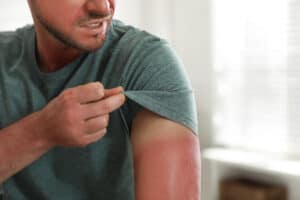
Ask The Expert: Sun Damage
WHAT DO I DO IF I BURN MY SKIN? Ideally, with the right high SPF sun cream and caution, sunburn can be avoided completely. However, in cases where sunburn happens, it is important to begin treating as soon as possible and get out of the

Worried about a mole?
A mole is a coloured spot on the skin which is made up of a cluster of cells known as melanocytes which are responsible for producing the pigment in your skin. Sometimes these melanocytes grow in a cluster instead of being spread out which results
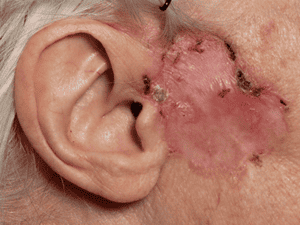
Is BCC (Basal Cell Carcinoma) a Completely Curable Disease? How?
You might not have heard of Basal Cell Carcinoma before, but it is actually the most common form of skin cancer in the UK. About 80% of the people who are diagnosed with skin cancer every year have a BCC. If you are diagnosed with










